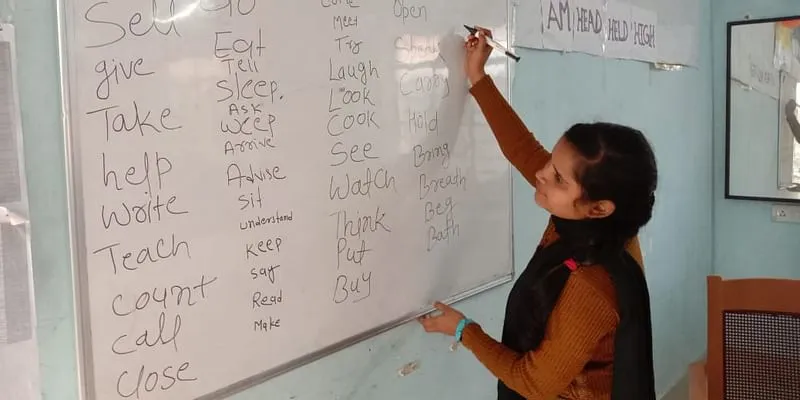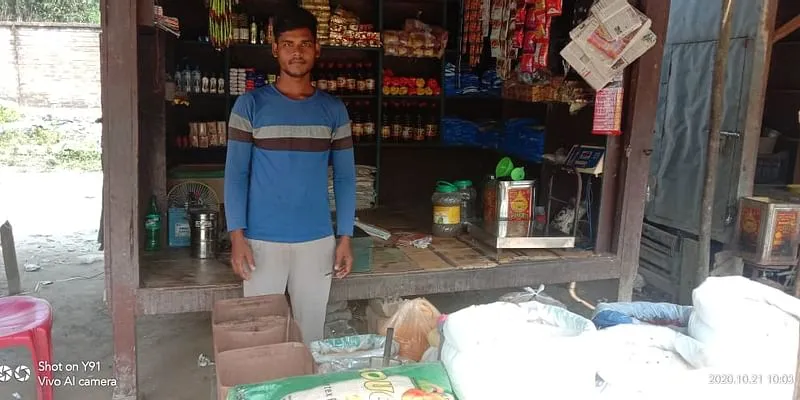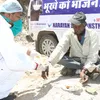How this NGO’s training programme is delivering skills and preparing the youth in rural Bihar for the future
Head Held High Foundation’s Youth Transformation Programme in Bihar’s Araria district is helping young people figure out their future.
During his classroom sessions in Kusiargaon village in north Bihar, Neeraj Kumar Jha – a trainer with Bengaluru-based NGO, Head Held High Foundation – often plays a motivational video. Titled ‘MBA Chaiwallah’, the video tells the story of a young man from Ahmedabad who started a roadside tea stall after a few failed attempts at getting into an MBA programme. The idea stems from rejection and proves to be hugely successful, and he soon has top MBA schools reaching out to him to use his example as a case study.
It’s a story that resonates with the young trainees in the classroom, located in an old building on the side of a national highway. By the end of the video, some of the viewers have tears in their eyes. They know firsthand what it’s like to have their aspirations stomped. And so the message that it’s possible to make it despite tremendous odds is especially powerful for them.
Anokha, a 21-year-old trainee in the programme, dropped out of school after Class X, largely due to her family’s financial circumstances. Her father’s mental health issues kept him from doing regular farming work and so her grandfather stepped in to support the family, including Anokha, her parents and her two younger brothers.
When Amlesh, a field worker and mobiliser for Head Held High Foundation, stopped by her house in late 2019 and told her about an upcoming batch of their primary rural intervention– the Make India Capable training programme run with funding support from Kotak Bank in the area–she liked what she heard. “I felt like this was my second chance to continue my education,” she says.

Anokha working on a classroom exercise during her time in the programme
Logistically speaking, it was an easy decision because the centre was located very close to her home. But there was still some family resistance that she had to overcome. She had to demonstrate that she could simultaneously manage her household responsibilities, and that trying to improve her communication and other soft skills would help her in the long run.
The programme (typically six months in duration) has a remedial component and aims to fill gaps in spoken English, Mathematics and digital skills for young school dropouts, largely from marginalised communities like Kusiargaon. It is also designed to address the challenges in terms of future planning for youth who have not had steady schooling or similar experiences to broaden their horizons.
Kusiargaon is part of Araria district, an aspirational district lagging on several development indicators – especially education and healthcare. The literacy rate, particularly among women, is well below the national average. The closest hospital is at least 60 km away. Kusiargaon itself lacks a full-fledged market, ATMs and eateries, and most daily requirements involve a trek to Araria district – a 12 km distance that takes 40 minutes by auto-rickshaw.
Although autos can be hailed during the day, it’s sometimes hard to get one in the evening when drivers – fearful of being targets of petty theft – refuse to pick up passengers.

Neeraj in his classroom in Kusiargaon, Araria district, Bihar
If these infrastructure challenges were not enough, Nature serves up another daunting challenge for those living in this part of the country. During the monsoon, rivers originating in neighbouring Nepal can cause heavy flooding. The worst flooding occurred in 2017 when many lives were lost in Araria and other parts of Bihar.
Neeraj himself is from Samastipur District, approximately 275 km west of Araria, and joined Head Held High Foundation in 2017 as part of a fellowship programme. He had a BA in Hindi and a vague sense that he enjoyed teaching but was unsure about how to pursue this as a career. After a four-month training stint at the Head Held High training centre in Tumkur, he gained clarity on what he wanted to do in life.
After joining the organisation’s team of trainers, he spent time at other field locations – Muzzaffarpur, Wani, Kymore, and Kagaria, to name a few– before landing in Araria in 2019.
At 26, Neeraj is not that much older than his students in Araria and as a Bihar native from a middle-class background, he can leverage a mix of local knowledge and empathy to connect with them. His own story, he often tells them, is an example of how defining one’s purpose in life can be transformational.
Anokha remembers one exercise that left a deep impression on her. Neeraj asked the group to come up with 20 common phrases in English. When she showed him her list, he asked her why it didn’t have more phrases. “Why stop at 20”, he asked her “when you could have written 30?”
“That really inspired me,” Anokha says, “it got me thinking about how we often hold ourselves back and let our minds create barriers for us.”
Due to the COVID-19 lockdown, it became necessary to shut down the physical centre and use phones to conduct the training sessions on an individual basis. This was challenging in Kusiargaon where connectivity can be very unreliable. “Sometimes you have to call someone ten times to get through,” Neeraj says.

Robin outside his small kirana setup in Kusiargaon, Araria, Bihar
Despite these challenges, a batch that commenced in May when the lockdown was still in effect has now been completed. Of the 21 trainees, some are now preparing to either launch their own small ventures in the Kusiargaon area, a few are starting jobs in Araria district, while others are planning a move to Gujarat to join a textile company, Welspun.
One of the new graduates is Robin, who dropped out of school in Class VIII and then spent the next few years doing odd farming jobs to supplement his family’s income. However, there was a part of him that regretted the decision to quit school. The Head Held High programme gave him a chance to pick up where he left off. Buoyed by the motivational nuggets from the sessions, he realised that he wanted to run his own business. In early October, he started his local venture – a small kirana store in Kusiargaon.
“I really didn’t want to leave this place,” Robin said. “I wanted to stay and start something right here.”
Following the training, Anokha discovered a long-held passion for teaching and has now started conducting tuition classes for students aged eight to 15. She says she goes through textbooks and various online resources to prep for the classes in English, Maths and Science – and makes around Rs 3,000 a month through this.
Once COVID-19 restrictions on offline classrooms are lifted, she hopes to complete the educational requirements needed to apply for a full-time teaching position in an Araria District school.
Like Robin, she has no desire to leave a place that she says feels like home. “This is a village and has its problems,” she said. “But you have everything you need for a decent life here.”
Head Held High is currently present in more than 65 locations across 19 states, running empowerment and employment initiatives, among other programs. This column is an attempt to highlight the challenges and stories as well as our solutions for these areas — through the experiences and voices of our teams on the ground.
Edited by Kanishk Singh
(Disclaimer: The views and opinions expressed in this article are those of the author and do not necessarily reflect the views of YourStory.)









